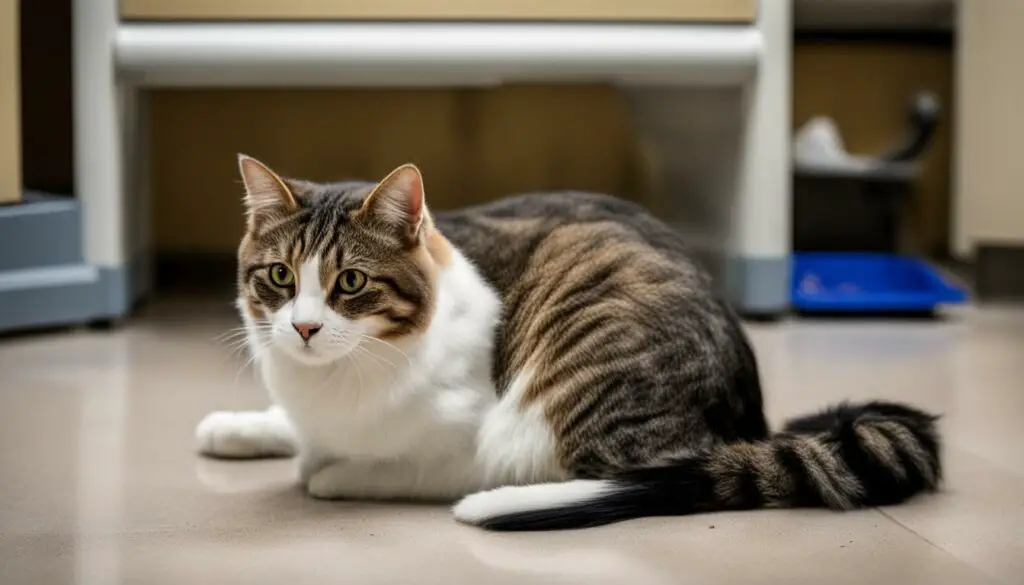After spaying or neutering a cat, it is not uncommon for them to experience diarrhea. This can be caused by various factors, including surgical stress, medications used during the procedure, and non-surgical causes like dietary changes or underlying health issues. Prolonged diarrhea can lead to dehydration, so it’s important to monitor your cat’s condition and seek veterinary advice if necessary.
Key Takeaways:
- Diarrhea after spaying or neutering in cats can be caused by surgical stress, medications, or non-surgical factors.
- Stress colitis, induced by the surgical process, can lead to diarrhea in cats.
- Medications used during spaying or neutering, such as anesthesia, antibiotics, and NSAIDs, can occasionally cause diarrhea.
- Non-surgical causes of diarrhea after spaying include sudden dietary changes, intestinal infections, parasites, and viral infections.
- If your cat experiences persistent diarrhea after spaying, consult with a veterinarian for proper evaluation and treatment.
Diarrhea Due to Surgical Stress (Stress Colitis)
One of the primary causes of diarrhea after spaying or neutering in cats is surgical stress, which can lead to a condition known as stress colitis. The stress induced by the surgical process, including the change in routine, unfamiliar environment, and the procedure itself, can trigger a stress response that disrupts the normal function of the digestive system. As a result, cats may experience diarrhea as their bodies adapt to the post-surgery situation.
Stress colitis is typically temporary and resolves as the cat’s stress levels return to normal. It is important to monitor your cat’s condition and provide comfort and reassurance during the recovery period.
Diarrhea Due to Surgical Stress (Stress Colitis)
If your cat is experiencing diarrhea after spaying or neutering, it may be due to surgical stress or stress colitis. This condition is temporary and usually resolves as the cat’s stress levels return to normal.
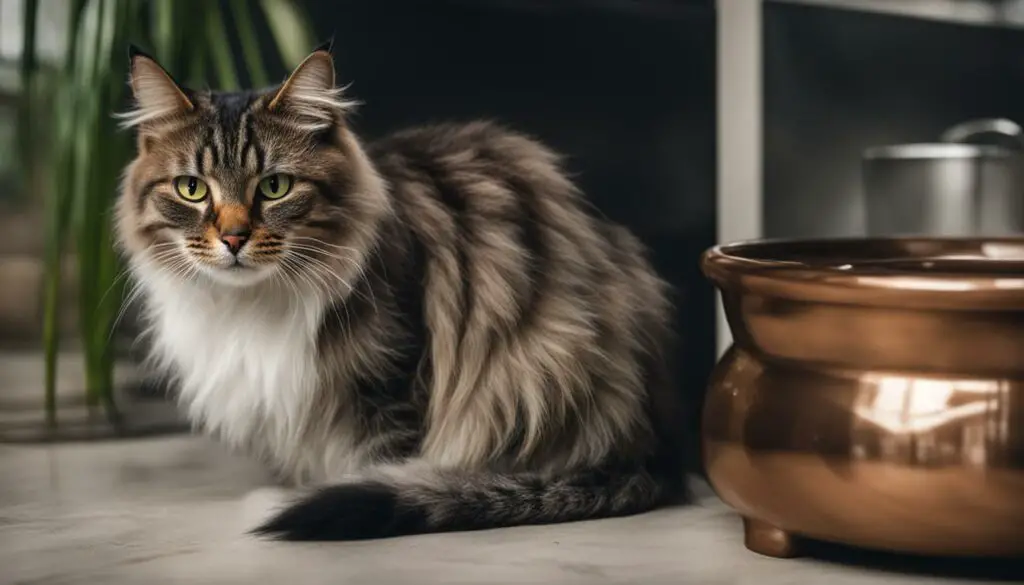
“Diarrhea after spaying or neutering in cats can be caused by surgical stress, but it is typically temporary and resolves on its own as the cat’s stress levels return to normal.” – Veterinary Specialist
Managing stress through providing a calm environment, comfort, and reassurance can aid in the resolution of diarrhea caused by surgical stress.
| Causes of Diarrhea After Spaying | Symptoms | Treatment |
|---|---|---|
| Surgical stress | Diarrhea, loss of appetite, increased thirst | Comfort and reassurance, monitor hydration, consult with a veterinarian if necessary |
| Medication side effects | Diarrhea, vomiting, lethargy | Discontinue medication if necessary, consult with a veterinarian for alternative options |
| Non-surgical causes (dietary changes, infections, parasites) | Diarrhea, abdominal pain, changes in appetite | Dietary management, medications for infections or parasites, consult with a veterinarian |
It’s important to note that if the diarrhea persists or worsens, or if your cat shows additional concerning symptoms, it is recommended to consult with a veterinarian for a proper evaluation and guidance on appropriate treatment options.
The next section will explore the potential role of medications in causing diarrhea after spaying or neutering in cats.
Medications and Diarrhea
Medications used during spaying or neutering, such as anesthesia, antibiotics, and nonsteroidal anti-inflammatory drugs (NSAIDs), can occasionally lead to diarrhea in cats. Anesthesia can slow down the movement of food through the digestive system, antibiotics can disrupt the gut microbiome, and NSAIDs can cause irritation and inflammation of the GI lining. These side effects are usually temporary and subside once the medication is discontinued.
In some cases, cats can experience diarrhea as a result of anesthesia. The bowel movements may be slower due to the impact of the anesthesia on the gastrointestinal tract. This can lead to the accumulation of fluids and cause diarrhea. As the effects of anesthesia wear off, normal bowel movements should resume.
“The medications used during spaying or neutering can occasionally lead to diarrhea in cats.”
Antibiotics are another common medication used during the spaying or neutering process. While they are necessary to prevent infection, they can disrupt the natural balance of bacteria in the cat’s gut, leading to diarrhea. It is important to complete the prescribed course of antibiotics to ensure that any underlying infections are properly treated.
NSAIDs may be prescribed to manage pain and inflammation after spaying or neutering. However, these medications can irritate the gastrointestinal lining, leading to diarrhea. If your cat experiences diarrhea while taking NSAIDs, consult with your veterinarian for alternative pain management options.
It is important to note that while medications may contribute to diarrhea after spaying or neutering, it is typically a temporary side effect. If the diarrhea persists or worsens, it is advisable to seek veterinary attention to rule out any underlying conditions or complications.
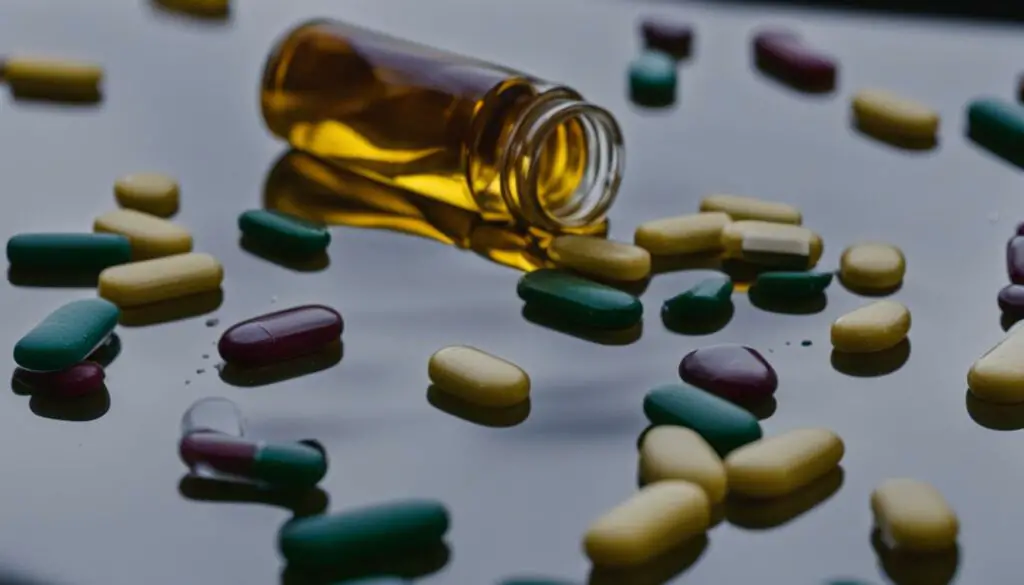
Non-Surgical Causes of Diarrhea
While diarrhea after spaying or neutering can often be attributed to surgical factors or medication side effects, there are also non-surgical causes that can contribute to this condition. Understanding these potential triggers can help you better manage your cat’s diarrhea and ensure their overall health and well-being.
Sudden Dietary Changes
One common non-surgical cause of diarrhea in cats is sudden dietary changes. Introducing new foods or abruptly changing the quantity of their current diet can disrupt the delicate balance of their digestive system, leading to loose stool. It’s important to gradually transition your cat to new foods and consult with your veterinarian about any necessary dietary adjustments.
Intestinal Infections and Parasites
Intestinal infections caused by bacteria, viruses, or fungi can also result in diarrhea after spaying. These infections can be contracted through contaminated food, water, or other environmental sources. Similarly, parasites like worms, giardia, or coccidia can infect the intestines and cause diarrhea. Regular deworming and practicing good hygiene measures can help prevent these infections and reduce the risk of diarrhea.
Viral Infections
In rare cases, cats may experience diarrhea after spaying due to viral infections. One such virus is feline panleukopenia, which is closely related to the canine parvovirus. This highly contagious virus can cause severe gastrointestinal symptoms, including diarrhea. Vaccination against feline panleukopenia is crucial in preventing this infection and its associated diarrhea.
Table: Non-Surgical Causes of Diarrhea in Cats
| Cause | Description |
|---|---|
| Sudden Dietary Changes | Introducing new foods or changing the quantity of their current diet |
| Intestinal Infections | Infections caused by bacteria, viruses, or fungi |
| Parasites | Infection with worms, giardia, or coccidia |
| Viral Infections | Infections such as feline panleukopenia |
By understanding the potential non-surgical causes of diarrhea after spaying and taking appropriate preventive measures, you can help keep your cat’s digestive system healthy and minimize the risk of diarrhea.
Seeking Veterinary Advice
If your cat is experiencing persistent diarrhea after spaying or neutering, it’s important to consult with a veterinarian. Diarrhea can be a symptom of various health issues, including complications from surgery or medication reactions. Your vet will conduct an evaluation and may recommend diagnostic tests to determine the cause of the diarrhea and provide appropriate treatment.
If you notice any of the following signs, it’s time to seek veterinary evaluation for spay-related diarrhea:
- Diarrhea persists for more than 48 hours
- Blood in the stool
- Severe abdominal pain or discomfort
- Vomiting
- Lethargy or loss of appetite
- Dehydration symptoms, such as excessive thirst or dry gums
“Persistent diarrhea after spaying can have various underlying causes that require veterinary attention. It’s important not to ignore these symptoms and seek professional help to ensure your cat’s health and well-being.” – Dr. Smith, DVM
During your vet visit, be prepared to provide information about your cat’s medical history, including any recent medications or dietary changes. Your vet may also ask about the consistency and frequency of the diarrhea, as well as any other accompanying symptoms. Based on the evaluation, diagnostic tests such as fecal examinations or blood work may be recommended to determine the cause of the diarrhea.
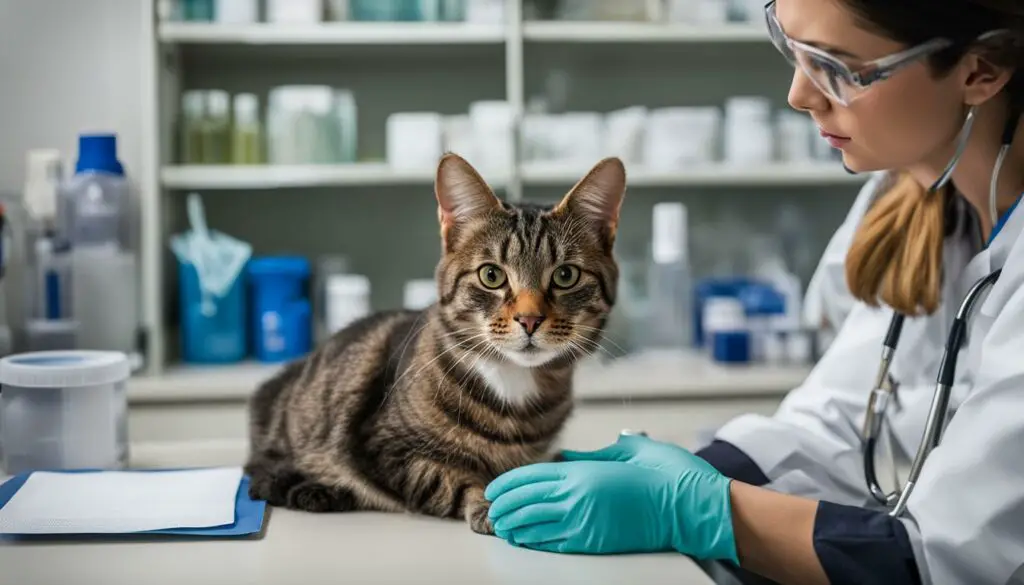
| Symptoms | Possible Causes |
|---|---|
| Persistent diarrhea for more than 48 hours | Underlying gastrointestinal condition, infection, or dietary intolerance |
| Blood in the stool | Intestinal inflammation, parasites, or more severe underlying conditions |
| Severe abdominal pain or discomfort | Possible surgical complications or other gastrointestinal issues |
| Vomiting | Possible reaction to medications or secondary gastrointestinal problems |
| Lethargy or loss of appetite | Possible dehydration, infection, or other systemic health issues |
| Dehydration symptoms | Lack of fluid intake or excessive fluid loss due to diarrhea |
Remember that each cat is unique, and the guidance provided by your vet is based on their individual needs. Seeking veterinary advice will ensure a proper diagnosis and tailored treatment plan for your cat’s specific situation.
Dietary Management
When managing diarrhea after spaying in cats, dietary changes play a crucial role in promoting recovery and restoring normal bowel movements. A bland diet consisting of easily digestible foods can help soothe the digestive system and reduce irritation. The key principles of managing diarrhea through diet include a bland, low-fat diet, gradual reintroduction of regular food, and consulting with a veterinarian for guidance.
What is a Bland Diet?
A bland diet typically consists of easily digestible foods that are gentle on the stomach and promote normal bowel movements. Boiled chicken and white rice are commonly recommended for cats with diarrhea as they are bland, low in fat, and provide essential nutrients. This combination helps soothe the digestive system while providing some nourishment. It is important to ensure the chicken is boneless and cooked thoroughly to avoid any potential hazards.
Gradual Reintroduction of Regular Food
Once the diarrhea has subsided, you can gradually reintroduce your cat’s regular food over a span of several days. This should be done in small increments, mixing a small amount of the regular food with the bland diet. Monitor your cat’s response to the reintroduced food and adjust accordingly. If the diarrhea returns, it may be necessary to consult with your vet for further guidance.
Consult with a Veterinarian
It is important to consult with a veterinarian before implementing dietary changes for managing diarrhea after spaying. They can provide specific recommendations based on your cat’s individual needs and overall health. A veterinarian can also help rule out any underlying health issues that may be contributing to the diarrhea and determine the most appropriate course of action.

| Bland Diet | Benefits |
|---|---|
| Boiled Chicken and White Rice | Gentle on the stomach, easy to digest |
| Low-Fat Diet | Reduces irritation in the digestive system |
| Gradual Reintroduction of Regular Food | Allows the digestive system to adjust gradually |
Electrolyte Solutions
When a cat experiences diarrhea after spaying, it is important to take steps to prevent dehydration. Diarrhea can lead to the loss of essential electrolytes, which are vital for maintaining proper hydration and bodily functions. By replenishing these electrolytes, you can help support your cat’s recovery and prevent further complications.
One effective way to provide electrolyte support is through the use of commercially available electrolyte solutions, such as Pedialyte or unflavored Gatorade. These solutions are formulated to contain the necessary minerals and salts that help restore electrolyte balance in the body. You can find them at most pharmacies or grocery stores.
If you prefer a homemade option, you can prepare a simple electrolyte solution using boiled water, sugar, and salt. However, it is important to consult with your veterinarian before administering any homemade remedies to ensure they are safe and appropriate for your cat’s specific needs.
| Electrolyte Solution Recipe | Ingredients | Instructions |
|---|---|---|
| Homemade Electrolyte Solution | 1 liter of boiled water | 1. Dissolve the sugar and salt in the boiled water and let it cool. 2. Administer the solution to your cat in small amounts using a syringe or dropper. 3. Offer the electrolyte solution in between regular meals and provide fresh water as well. |
| 1 tablespoon of sugar |
Remember to monitor your cat’s condition closely and consult with your veterinarian if the diarrhea persists or worsens. They can provide further guidance and recommend additional treatments if necessary.
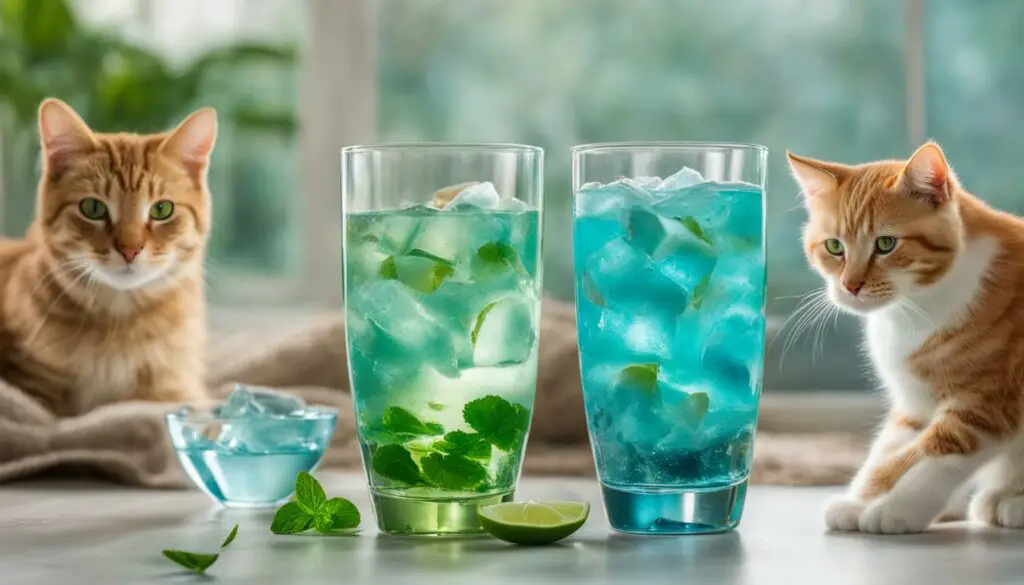
Fiber-Rich Diets
When it comes to managing diarrhea after spaying in cats, incorporating fiber-rich diets can be beneficial. Fiber adds bulk to the stool and absorbs excess water, helping to solidify the stool and normalize bowel movements. One option is to include canned pumpkin in your cat’s diet. Not only is it rich in fiber, but it also contains essential nutrients like vitamins A, C, and E. Add a small amount of canned pumpkin to your cat’s food, gradually increasing the quantity over time.
Another way to introduce fiber is by incorporating cooked sweet potato into the diet. Sweet potatoes are high in fiber and provide additional nutritional value. Cooked sweet potato can be mashed and mixed with your cat’s regular food. Ensure that the sweet potato is thoroughly cooked and free of any seasoning or additives.
If you prefer to use fiber supplements, consult with your veterinarian for recommendations. There are various fiber supplements available specifically formulated for cats. These supplements can be mixed with your cat’s food, ensuring they receive the necessary fiber intake for digestive health. Remember to follow the recommended dosage instructions provided by your veterinarian for optimal results.
Table: Fiber-Rich Foods for Cats
| Fiber-Rich Foods | Fiber Content (per 100g) |
|---|---|
| Canned Pumpkin | 2.7g |
| Cooked Sweet Potato | 2.5g |
Incorporating fiber-rich foods or supplements into your cat’s diet can help control diarrhea after spaying. However, it’s important to introduce these changes gradually and under the guidance of your veterinarian. They can assess your cat’s specific dietary needs and provide tailored recommendations for effective management of post-spay diarrhea.
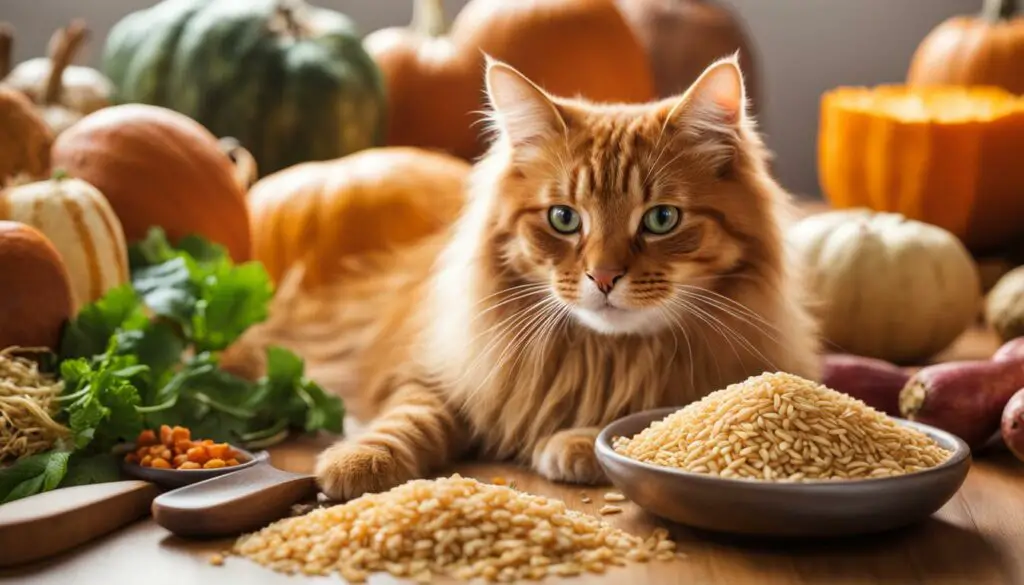
Probiotics and Prebiotics
When it comes to managing diarrhea after spaying in cats, probiotics and prebiotics can play a crucial role in restoring gut balance and promoting digestive health. Probiotics are beneficial bacteria that help maintain a healthy gut microbiome, while prebiotics provide nourishment for these bacteria.
Probiotics can help replenish beneficial bacteria in the gut, which can be disrupted due to surgical stress, medication use, or changes in diet. These live microorganisms can aid in regulating digestion, improving nutrient absorption, and boosting the immune system.
In addition to probiotics, prebiotics can also be beneficial for cat gut health. Prebiotics are non-digestible fibers that help stimulate the growth of beneficial bacteria in the gut. They act as a food source for these bacteria, allowing them to flourish and enhance the overall functioning of the digestive system.
Before introducing probiotics or prebiotics to your cat’s diet, it’s important to consult with your veterinarian. They can recommend appropriate products and dosages based on your cat’s individual needs and health condition. Probiotics and prebiotics can come in various forms, including powders, capsules, or specially formulated cat foods. By incorporating these supplements, you can help restore gut balance and alleviate diarrhea in your cat after spaying.

Duration of Diarrhea After Spaying
After a cat undergoes spaying, it is not uncommon for them to experience diarrhea. This can be a temporary side effect caused by factors such as surgical stress, medication side effects, or non-surgical causes like dietary changes or underlying health issues. Understanding the duration of diarrhea after spaying can help pet owners monitor their cat’s condition and know when to seek veterinary advice.
If the diarrhea is due to surgical stress, it usually subsides within 24-48 hours as the cat adapts to its post-surgery routine. Stress colitis, triggered by the stress induced by the surgical process, can disrupt the normal function of the digestive system, leading to diarrhea. This condition typically resolves as the cat’s stress levels return to normal.
Diarrhea caused by medication side effects usually improves once the medication is discontinued or changed. Medications used during spaying, such as anesthesia, antibiotics, and NSAIDs, can occasionally lead to diarrhea in cats. Anesthesia can slow down the movement of food through the digestive system, antibiotics can disrupt the gut microbiome, and NSAIDs can cause irritation and inflammation of the GI lining.
| Cause of Diarrhea | Duration |
|---|---|
| Surgical Stress | 24-48 hours |
| Medication Side Effects | Varies; improves after discontinuation |
| Non-Surgical Causes | Varies; depends on the underlying issue |
Non-surgical causes of diarrhea after spaying, such as sudden dietary changes, intestinal infections, parasites, or viral infections, can have varying durations depending on the underlying issue. It’s important to consult with a veterinarian if the diarrhea persists or worsens, as it can be a symptom of complications from surgery or underlying health conditions. Veterinary evaluation and diagnostic tests can help determine the cause and guide appropriate treatment.
Aftercare and Prevention
Proper aftercare is crucial for managing post-spay diarrhea in cats and preventing future episodes. By following these steps, you can help maintain your cat’s health and minimize the risk of diarrhea:
- Monitor your cat’s litter box hygiene: Keeping the litter box clean and providing fresh litter can help prevent diarrhea caused by ingesting bacteria or parasites from feces. Scoop the litter box at least once a day and change the litter regularly.
- Provide a balanced diet: Feeding your cat a high-quality, nutritionally balanced diet can help support their digestive health. Avoid sudden dietary changes, as this can trigger diarrhea. Consult with your veterinarian to determine the best diet for your cat’s specific needs.
- Maintain regular veterinary care: Regular check-ups with your vet are essential for monitoring your cat’s overall health and detecting any underlying conditions that may contribute to diarrhea. Vaccinations, parasite prevention, and annual examinations can help prevent infections and maintain your cat’s well-being.
- Promote stress reduction: Minimizing stress in your cat’s environment can help prevent stress-induced diarrhea. Provide a comfortable and secure space for your cat, with access to hiding spots, toys, and scratching posts. Avoid sudden changes in routine or introducing new pets or people without proper introductions.
Table: Tips for Preventing Post-Spay Diarrhea
| Tips | Description |
|---|---|
| Monitor litter box hygiene | Keep the litter box clean and provide fresh litter to prevent ingestion of bacteria or parasites. |
| Provide a balanced diet | Feed your cat a nutritionally balanced diet and avoid sudden dietary changes. |
| Maintain regular veterinary care | Regular check-ups with a veterinarian can help detect and prevent infections and underlying health issues. |
| Promote stress reduction | Create a calm and secure environment for your cat, avoiding sudden changes or introductions. |
By implementing these aftercare measures and taking proactive steps to prevent diarrhea, you can help ensure your cat’s post-spay recovery is smooth and comfortable.
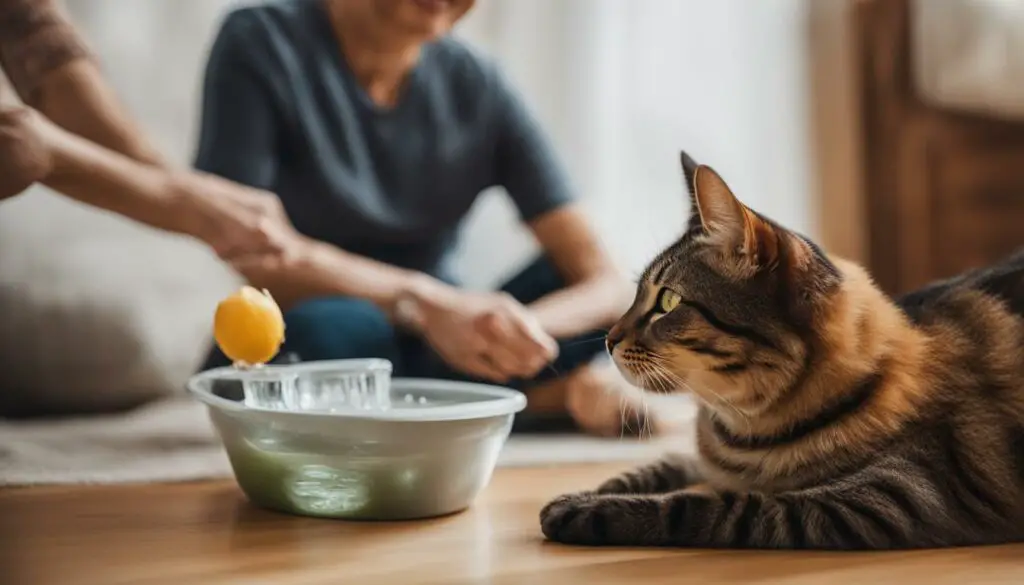
Incision Care and Preventing Complications
After spaying your cat, proper incision care is crucial to prevent complications and ensure a smooth recovery. By following these guidelines, you can help manage the incision site and reduce the risk of infection and other issues.
First and foremost, it’s important to monitor the incision site regularly for any signs of redness, swelling, discharge, or a foul odor. If you notice any of these symptoms, it’s essential to contact your veterinarian for further guidance.
Preventing your cat from licking or biting the incision is vital to avoid infections and premature suture removal. You can use an Elizabethan collar or a soft e-collar to prevent your cat from accessing the area. Additionally, distracting your cat with interactive toys or puzzle feeders can help redirect their attention away from the incision.
During the recovery period, it’s important to limit your cat’s physical activity to prevent excessive strain on the incision site. Avoid high-impact activities, such as jumping or running, and provide a calm and quiet environment for your cat to rest and heal.
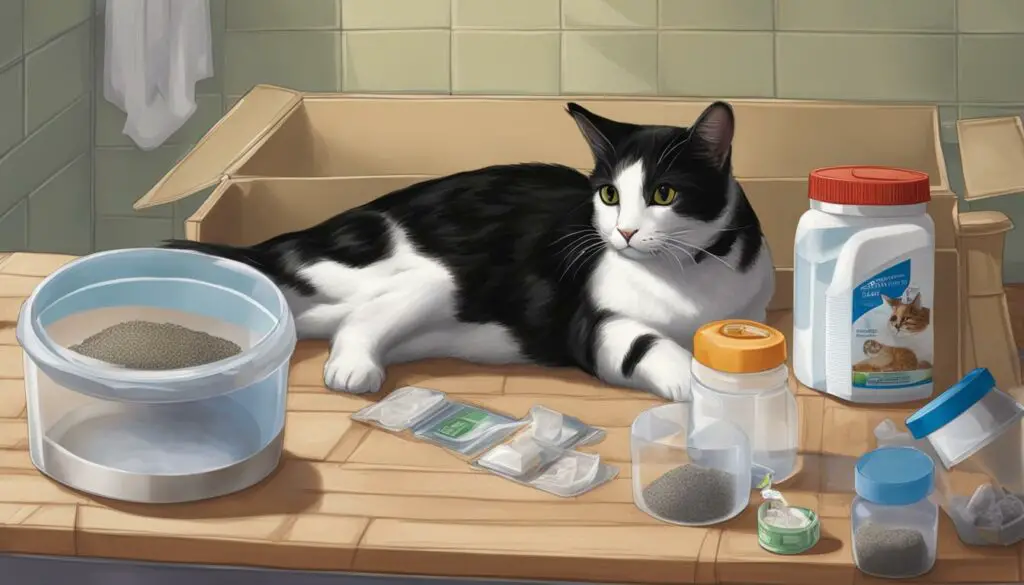
Conclusion
In summary, managing diarrhea after spaying in cats requires a multi-faceted approach. It is important to understand that diarrhea can occur due to various factors such as surgical stress, medications, dietary changes, or underlying health issues. By addressing these causes and seeking veterinary advice, you can effectively manage and prevent diarrhea in your cat.
During the recovery period, it is crucial to provide your cat with a bland, low-fat diet to alleviate digestive irritation. Additionally, electrolyte solutions like Pedialyte can help prevent dehydration, while fiber-rich diets and probiotics can aid in normalizing bowel movements and restoring gut balance.
Proper aftercare, including incision care and preventing complications, is essential for your cat’s overall well-being. By following your veterinarian’s instructions, maintaining litter box hygiene, and providing pain management as needed, you can ensure a smooth recovery without complications.
In conclusion, by being proactive in managing post-spay diarrhea, you can help your cat feel better and maintain optimal health. Remember to consult your vet for personalized advice and guidance, as every cat is unique. With proper care and attention, you can ensure a successful spay recovery and minimize the occurrence of diarrhea in your beloved feline companion.
FAQ
What causes diarrhea in cats after spaying or neutering?
Diarrhea can be caused by surgical stress, medications used during the procedure, dietary changes, or underlying health issues.
How long does diarrhea typically last after spaying or neutering?
The duration of diarrhea can vary, but it usually resolves within 24-48 hours for stress-related cases and improves once medications are discontinued or changed.
When should I consult a veterinarian for post-spay/neuter diarrhea?
It’s important to seek veterinary advice if the diarrhea persists, worsens, or if your cat shows other concerning symptoms.
What can I do to manage diarrhea after spaying or neutering?
Dietary management, electrolyte solutions, fiber-rich diets, and probiotics/prebiotics can help manage diarrhea. It’s important to consult with your vet before making significant dietary changes.
How can I prevent diarrhea after spaying or neutering?
Following your vet’s aftercare instructions, maintaining litter box hygiene, and providing proper incision care can help prevent complications and diarrhea. Regular veterinary care is also important for cats with underlying conditions.

